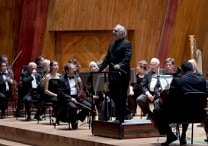It is in French that we can establish the etymological origin of the term overture that we are now going to analyze in depth. Specifically, it derives from the word “ouverture”, which means “opening” or “musical prelude” and which is the result of the sum of two lexical components:
-The French verb “ouvrir”, which is synonymous with “to open” and which derives from the Latin “aperire”, which also means “to open”.
-The Gaulish suffix “-ure”, which emanates from the Latin suffix “-ura”, which is used to indicate what is “the result of the action”.
The instrumental fragment that marks the beginning of an opera or other type of lyrical composition is called an overture .
 In the case of operas, overtures became popular in the 17th century . The most common, at that time, were the so-called Italian overtures (which had a fast section, another slow section and finally a fast third part) and the French overtures (which started slow and then became fast).
In the case of operas, overtures became popular in the 17th century . The most common, at that time, were the so-called Italian overtures (which had a fast section, another slow section and finally a fast third part) and the French overtures (which started slow and then became fast).
Over time , the overtures began to forge a closer bond with the rest of the composition. In this way, they began to establish the emotional line of the work that followed.
Already in the 19th century , the most common overtures were developed with a single movement , leaving aside the three movements of the Italian overtures and the two movements of the French ones. Composers such as Richard Wagner and Gioacchino Rossini contributed to the dissemination of these pieces.
“The Flying Dutchman” by Wagner and “The Barber of Seville” by Rossini are two of the many operas that have an overture as a starting point. It is important to keep in mind that there are also independent compositions that are called overtures.
The “Tragic Overture” by Johannes Brahms and the “Coriolanus Overture” by Ludwig van Beethoven are among the best-known overtures.
In the same way, we cannot ignore that “Overture 1812” is the title of a romantic overture created in 1880 by the famous Russian composer Pyotr Ilyich Tchaikovsky. Specifically, he created it with the aim of commemorating the victory of the Russian resistance in 1812 against the troops of General Napoléon Bonaparte.
That aforementioned overture was premiered in 1882 in Moscow and is well known within the musical field for its uniqueness. Specifically, because it ends in a truly surprising way: with the ringing of bells and a volley of cannon shots.
It is one of the most important compositions in Tchaikovsky's career and it must be stated that it is currently used to set music to some of the activities carried out on Independence Day in the United States.
Beyond classical music, the song “Obertura” appears, a song composed by Luis Alberto Spinetta that is part of the latest album by Almendra , a rock band from Argentina .
